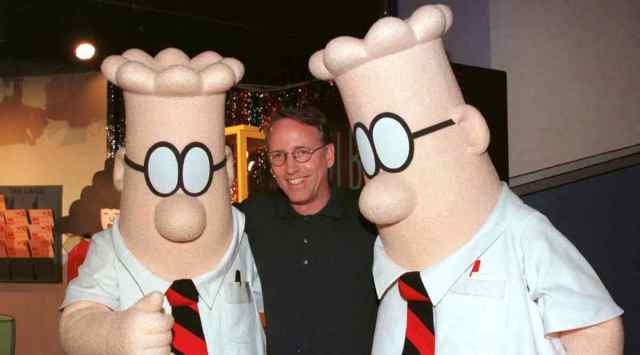
When I was a kid, the only page that appealed to me in the newspaper was the comics page. I would devour strip after strip, from Dennis the Menace to Hagar the Horrible, Garfield to Beetle Bailey. While the majority of syndicated strips could easily be understood by an eight-year-old, there was one strip that went right over my head. It took me almost another eight years to finally understand Dilbert and his utterly dysfunctional workplace. Dripping with corporate ennui and cynicism, Dilbert became relatable when I started working in my early twenties. The series had every office caricature you could imagine. The underqualified, overpaid, and borderline evil boss man. The sycophantic co-worker who appears hard-working yet hardly works. Those idea guys from marketing with lots of faff and little follow-through. Dilbert’s creator Scott Adams literally painted a picture (three to be exact) on a weekly basis that every person who had worked a 9-to-5 gig could identify with.
I used to think that Adams identified with Dilbert himself, the almost singularly sane if slightly hapless voice of reason in an anti-labour hellhole of an office. But at some point over the last decade or so, it seems Adams started metamorphosing into Dilbert’s pointy-haired boss who has little regard for racial and gender sensitivity. His most recent escapade saw him label POC survey respondents as a hate group because they did not agree with or couldn’t decide if it was “okay to be White”. On the face of it, that might seem like an alarming stance to take as a respondent. After all, being White in itself should not be considered problematic.
However, what Adams might not have realised is that the slogan itself, “It’s okay to be White”, has become a rallying cry for White supremacists and neo-Nazi groups in the US. Some may want to give Adams some leeway, that his statement was more a joke than a declaration. If it was a joke, it was a terrible one. Not only did it not land, but it mangled its maker’s career in the process. Since his comments came to light, more than a hundred newspapers and publishing houses have severed ties with the author. In fact, Adams himself has since said that “most of my income will be gone by next week” and that “my reputation for the rest of my life is destroyed.”
However, this isn’t the first time Adams has come out with rather bizarre opinions about race and gender. From comparing women asking for pay parity to bratty children demanding candy to identifying as “Black because I like to be on the winning team”, it’s evident that Adams does feel that he is persecuted as a White cis-male in today’s world. He has claimed that the Dilbert animated series was cancelled by UPN because they wanted more gender-diverse content and that there were two other corporate jobs he lost out on because of his skin colour.
In one of his more recent Dilbert strips, a Black employee is perturbed because he is recommended for a promotion just because he is a person of colour. Of course, said Black employee throws his integrity out the window when the promotion comes with a massive pay hike. Then there’s Adam’s problem with “wokeness”, evident in another Dilbert strip where employees are informed that performance reviews now have a wokeness meter. Questioning it leads to a deduction in your wokeness score.
The irony that Adams is complaining about being discriminated against for being White in America is hard to miss. After all, this is the same country where George Floyd was killed by an on-duty police officer in broad daylight in front of a host of eyewitnesses. In many ways, race is to the US what caste is to India. Some are afraid they might lose out on career and educational opportunities because of caste-based reservations. At the same time, in another part of the country, a young Dalit boy is beaten to death for touching a drinking water pot. Becoming more “woke” is not a bad thing. If anything, it makes us less ignorant. And ignorance can be dangerous.
So, Scott Adams, in summation, is it okay to be White in today’s world? I don’t know. Is it easier to be White? Unfortunately, it is.
Saju is a stand-up comedian, writer and editor